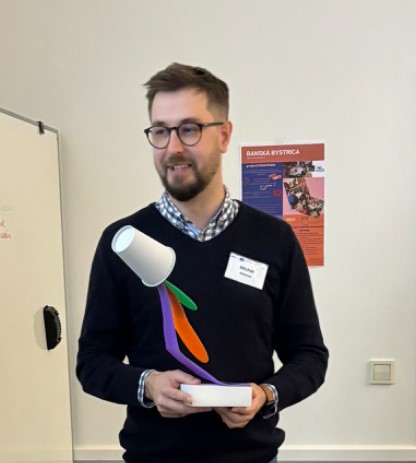Representative democracy as we have known it for many years doesn't seem to be working as well as it used to, so we are looking for more deliberative ways of making decisions. The idea is to get citizens more actively involved in the decision-making process. Views on this change are devided. There are those who are in favour of change and there are those who are more reluctant to do so. The URBACT Agents of the Co-Existence Network will explore ways to foster civic participation. In particular, they will look at the role of civil servants. Can they be the bridge between politics/politicians ('the government') and the citizens/NGOs who want to be more and better involved in decision-making? And if so, what skills and competences do these "21st century fit civil servants" need for this role?
Improving citizen participation
In the URBACT Agents of Co-Existence Network, nine municipalities have joined forces to improve citizen participation. Based on previous experiences, either within their city or from elsewhere, they are looking for ways to involve citizens in decision-making. Some already have years of experience, others are just getting started. But they all believe that involving citizens in decision-making is the way forward for a 21st-century fit civil society.
A good example of citizen participation is the creation of a participatory budget. It is a way to allow citizens to develop and implement ideas for the common good of their neighbourhood or city. There are also several examples of citizens’ assemblies within the network. Some of them have had great results, others have not worked so well.
Learning from mistakes
 Learning from both good and bad practices is key for the network, which is why they have introduced their own 'OOPS challenge cup'. The cup is awarded to the city with the "best bad practice", this being a bad example of citizen participation from which the most lessons can be learned. The first edition of the 'OOPS award' was awarded to the city of Gdańsk (PL) for sharing the challenges they faced with their third edition of a citizens' assembly. Although 2 previous editions of their citizens' assembly had been successful, this third one was not. One of the reasons was that the topic for discussion was not clearly defined, which led to vague recommendations that were too difficult to implement, which then again led to discouragement and distrust among citizens. As a result, a lot of the goodwill created by earlier assemblies got lost along the way. This example clearly shows where things can take a wrong turn if you are not careful in designing the citizen participation and/or decision-making process.
Learning from both good and bad practices is key for the network, which is why they have introduced their own 'OOPS challenge cup'. The cup is awarded to the city with the "best bad practice", this being a bad example of citizen participation from which the most lessons can be learned. The first edition of the 'OOPS award' was awarded to the city of Gdańsk (PL) for sharing the challenges they faced with their third edition of a citizens' assembly. Although 2 previous editions of their citizens' assembly had been successful, this third one was not. One of the reasons was that the topic for discussion was not clearly defined, which led to vague recommendations that were too difficult to implement, which then again led to discouragement and distrust among citizens. As a result, a lot of the goodwill created by earlier assemblies got lost along the way. This example clearly shows where things can take a wrong turn if you are not careful in designing the citizen participation and/or decision-making process.
The role of civil servants
As mentioned above, one of the main objectives of the Agents of Co-Existence Network is to look at the role of civil servants. Studies show that, in general, all actors involved in local democracy are in favour of more participatory decision-making, whether they are politicians, citizens from civil society or civil servants. Civil servants consider it important to involve citizens in the decision-making process. However, they lean more towards 'consulting citizens' rather than giving them actual decisive powers. This is not so strange, given that civil servants are usually experts in their field and are not trained or used to relying on the expertise of the general public. Also, 'the system' doesn't always make it easy for civil servants to involve citizens in the decision-making process. These characteristics of industrial-era administration act as obstacles to societal change:
- a rule-based mindset (no room for improvisation or doing things a different way
- short-termism (the project needs to be finished as soon as possible, no time)
- incremental decision-making (who is the real decision-maker?)
- silo-based implementation (gives employees a sense of stability)
When you take these characteristics into account you can easily see why it is difficult to engage civil servants in participation processes with citizens on topics for which they are responsible.
Civic participation requires systemic changes
In a general sense, we see that old, long-established habits of decision-making in the public domain often get in the way of effective cooperation between citizens and the government. We realise that existing ways are no longer working, but at the same time we find it very difficult to introduce new ways from within the system we have set up. Instead of bringing about systemic change, we opt for what appears to be a safe option: we introduce new ways of working through pilots. If the pilot works, we copy it for other projects, until there comes a time when the pilot does not work, and then we let things rest. Just as the example of the Gdańsk case with the citizens' assemblies shows. In reality, for a real transition, we need this systemic change: a different behaviour from politicians, civil servants and also from citizens / civil society. Each and every one of us has a role to play in successfully opening up the decision-making process.
Over the next 2 years, the Agents of Co-Existence network will focus on improving the skills and competences of municipal staff while creating new organisational structures to further boost civic participation and create a more solid basis of democracy. For it is as the mayor of the City of Genk, lead partner of the network, said when kicking off the Network’s first meeting in November: “Civic participation is a process, not a project!”

